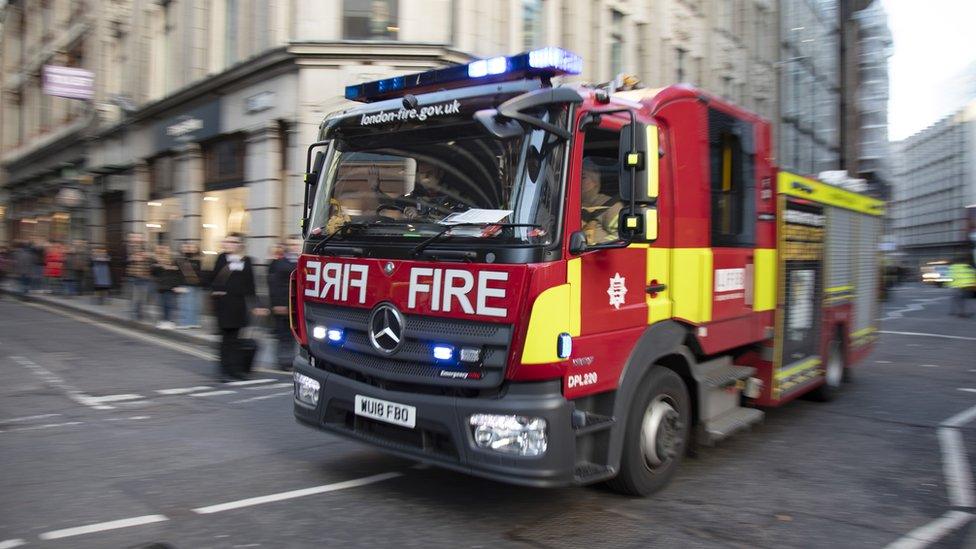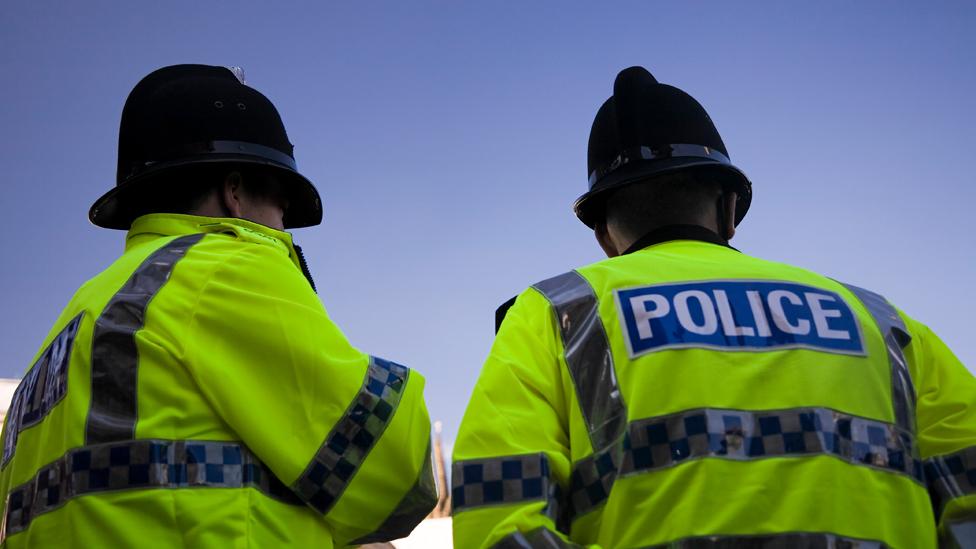London Fire Brigade institutionally misogynist and racist - report
- Published
London Fire Brigade report: "If female firefighters aren't safe from men, neither are we"
London Fire Brigade is "institutionally misogynist and racist", according to a damning review into its culture.
A black firefighter had a noose put by his locker, while a female one received video of a colleague exposing himself.
The independent review, external was established by the London Fire Commissioner after a trainee firefighter took his own life in August 2020.
Commissioner Andy Roe said there was no place for discrimination, harassment and bullying in the brigade.
"From today it will be completely clear to all staff what behaviour isn't acceptable and what the consequences will be," he added.
'Grim reading'
The review, conducted by the former Chief Crown Prosecutor for north-west England, Nazir Afzal, concludes that unless the "toxic culture" is tackled then other firefighters will take their own lives.
It lists a number of instances of abuse and poor behaviour at almost all levels of London Fire Brigade (LFB), including:
Multiple cases of bullying "and the targeting of ethnic minorities and women" with some complaints not investigated
Women "sexually taunted", including one who received video calls from a man exposing his genitalia
Men "huddled around a screen watching porn" at some fire stations
Talking to the BBC, Mr Afzal said the report made for "grim reading".
"We've heard example after example about women who were harassed or sexually assaulted - constant sexual taunting to the point that I am now saying that the London Fire Brigade is institutionally misogynist," Mr Afzal said.
"In addition to the misogyny, there is an enormous amount of racism. One black man had a noose put up above his locker, another Muslim officer had bacon rolled on his plate before he ate.
"Women told us they were told [by male firefighters]: 'We want to get you out of here, we don't want you to be a fire officer.' It goes back to the whole fireman concept.
"I sat with a very senior female officer who said to me, through tears, that whenever she goes through a dangerous incident, she's always thinking: 'Will the men have my back? Will the men around me protect me given how they have treated me back at the station?
"If they feel they can't trust the men around them because of their behaviour or misbehaviour and worse, then they aren't safe and neither are we."

The behaviour of some staff "left a clear trail of psychological harm", the report found
The report also found that while there was often "considerable sensitivity" in the brigade around issues of race, there appeared to be "a worrying blind spot" concerning misogyny and sexism.
One firefighter told the review that she advised her female friends not to let male firefighters in the house to give safety advice because "they go through women's drawers looking for underwear and sex toys".
The review recommends firefighters now wear body-worn video for home visits.
The behaviour of some brigade staff "left a clear trail of psychological harm", the report said.
Mr Afzal said the racism, misogyny and bullying identified within the LFB was far more widespread.
Speaking to the BBC Radio 4's Today programme, he said he was approached by other fire brigades and organisations as he undertook the review.
"People telling me please, please come and have a look at my culture.
"I ask anyone who's rushing to judgement on London Fire Brigade to look in the mirror and look at themselves because they will see similar things happening.
"Their staff need the same support and protection that London Fire Brigade need to provide to theirs."
The Fire Brigades Union (FBU) said in a statement the report confirmed concerns it had raised over many years.

The review, written by Nazir Afzal, concludes that unless the "toxic culture" is tackled then other firefighters will take their lives
Gareth Cook, FBU's regional organiser for London, said morale and engagement at LFB was low.
He said 40% said they were frustrated in their job with staff shortages, no leave availability and poor work-life balance.
"The review has found that staff fear the consequences of speaking out as they fear the repercussions. That is entirely unacceptable and must change," he said.
He added: "We have raised concerns about many of the issues contained within this report historically and as a consequence we remain sceptical about the changes senior leaders will implement with regards to their own behaviours."
LFB Commissioner Mr Roe told BBC Radio 4's Today programme he was "horrified" and "heartbroken" to read the report.
'Change starts now'
Asked if he agreed with the review's finding the organisation was institutionally misogynist and racist, he said: "I think when 2,000 of your staff have written that story you can't deny any of it. I accept the report in full, I accept all the recommendations.
"There will be change and the change starts now."
"From Monday we are putting externally into the hands of independent experts all of our complaint, harassment, bullying investigations," he added.
Mr Roe said he hoped employees would have the confidence to raise concerns and the organisation would "take action against people who let the service down."
Even seniority appears not to have insulated some women from abuse: former Commissioner Dany Cotton, who became the first woman to lead LFB, said she had received death threats following an anti-sexism campaign she was promoting.
Despite a series of failings, the review found most participants thought their workplace was "supportive and friendly".
It also found examples of "good leadership" including people who "went out of their way to build inclusive environments and operate a zero-tolerance policy around discrimination" but described it as "uneven and patchy" across the brigade.
'Watershed moment'
Black, Asian and minority ethnic staff felt they "must work twice as hard to be seen and heard", the report said, adding that non-white staff were more likely to be disciplined and less likely to be promoted.
In one instance a Muslim firefighter was spoken to in an Indian accent by his colleagues and had a piece of bacon put in his sandwich.
When he transferred to another watch, his colleagues put a pork sausage in his pocket, the report said. He subsequently had a terrorism hotline sticker placed on his locker, but his complaints were dismissed. He eventually collapsed at work and was admitted to hospital, and has since been diagnosed with PTSD and has had suicidal thoughts.
The Grenfell Tower fire was described as having a "seismic impact on the culture of LFB", particularly on the mental health of staff.
North Kensington fire station, which is less than a mile from the tower, was "widely recognised as a supportive station with a strong and diverse culture".
Mayor of London Sadiq Khan said the details of misogyny and racism were "abhorrent" and said the findings of Mr Afzal review "must be nothing short of a watershed moment for the London Fire Brigade."

Do you work in a fire service? Have you had experience of misogynistic or racist behaviour at work? Share your experiences by emailing haveyoursay@bbc.co.uk, external.
Please include a contact number if you are willing to speak to a BBC journalist. You can also get in touch in the following ways:
WhatsApp: +44 7756 165803
Tweet: @BBC_HaveYourSay, external
Please read our terms & conditions and privacy policy
If you are reading this page and can't see the form you will need to visit the mobile version of the BBC website to submit your question or comment or you can email us at HaveYourSay@bbc.co.uk, external. Please include your name, age and location with any submission.
- Published17 October 2022
